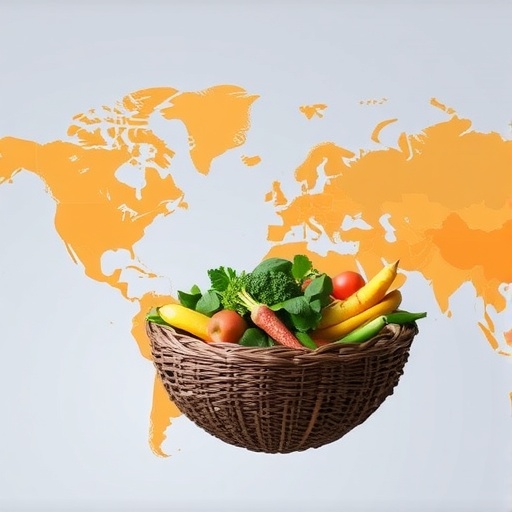A groundbreaking study from the Institute of Environmental Science and Technology at the Universitat Autònoma de Barcelona (ICTA-UAB) has unveiled critical insights into the economic dynamics of the global agri-food system, exposing entrenched inequalities in value distribution. This pioneering research details how, although the vast majority of agricultural products are cultivated in nations of the Global South, it is predominantly the Global North that captures most of the ensuing economic value through control of post-farmgate activities such as processing, logistics, and financial services. The implications of such disparities underscore systemic structural inequities that persist in global food value chains.
Analyzing data spanning 25 years—from 1995 to 2020—the study conducted by Meghna Goyal, Jason Hickel, and Praveen Jha employs rigorous statistical methodologies to dissect the global agri-food economy’s value-added components. Their findings are striking: non-agricultural sectors, largely dominated by Global North countries, absorb the majority share of value generated within agri-food systems. Despite notable growth in agricultural output from Global South countries, the lion’s share of economic benefits continues to accrue to Northern economies, whose post-production sectors wield considerable influence.
This imbalance manifests in sectors beyond primary agriculture—specifically food processing, transportation logistics, financial services, and other ancillary functions. These stages of the value chain add substantial monetary worth to agricultural outputs yet remain geographically and economically distant from the origins of raw production. This centralization of profit among the Global North magnifies the systemic economic dependencies of Southern producers, reinforcing a persistent and problematic division of labor on a global scale.
Critically, the study also unveils how tax optimization strategies exacerbate these disparities. Considerable portions of agri-food revenue are registered in low-tax jurisdictions with minimal agricultural activity, such as Singapore and Hong Kong. These financial hubs frequently claim value multiples vastly exceeding their actual production inputs—up to 60 times more in Singapore’s case—highlighting how profit allocation mechanisms prioritize capital gains over genuine production or employment contributions. This revelation illuminates how global corporate strategies compound value concentration in affluent economies regardless of physical agricultural output.
Such patterns contribute to structural unequal exchange, whereby the Global South remains entrenched as a primary goods producer while the Global North dominates lucrative secondary and tertiary stages of the supply chain. This asymmetry undermines economic sovereignty for Southern countries and perpetuates cycles of underdevelopment and inequitable growth. The research emphasizes that without intentional reforms, these entrenched power imbalances will continue to stifle equitable development in the global food system.
Lead author Meghna Goyal warns of the broader consequences, stating that value capture mechanisms reshape entire supply chains, often to the detriment of equitable development. The ability of Northern economies to harness value disproportionately reconfigures global agrifood systems, potentially creating adverse developmental outcomes for producers and economies in the South who do not receive their fair share of income generated by their labor and resources.
Jason Hickel, a coauthor of the study, describes the findings as a damning indictment of current global food value distribution: “The people who do the bulk of agricultural production—those who sustain global civilization through their labor—are denied a fair share of the financial returns generated from food systems.” This systemic injustice, he suggests, calls for urgent interventions that rectify the skewed economic architecture reinforcing inequities.
The researchers call for renewed economic sovereignty initiatives within the Global South, advocating transformative policies that prioritize reclaiming control over value-added processes and profits within agri-food value chains. Such measures could enable producer nations to harness more of the wealth derived from their output, thus fostering more inclusive and sustainable development trajectories globally.
Moreover, these findings challenge traditional narratives of economic development that focus solely on increasing production volumes without addressing how generated value is distributed and capitalized. The study’s data-driven approach provides actionable insights that can better inform policymakers seeking to dismantle inequitable global trading architectures and empower marginalized producers.
In revealing the stark discrepancies between where agricultural value is created and where it is ultimately captured, this research adds a vital dimension to ongoing debates concerning global food security, trade justice, and sustainable development. By exposing the structural roots of value concentration in Global North economies, it galvanizes calls for systemic reform aimed at achieving a more equitable global food economy.
This comprehensive examination of agri-food value chains over a quarter-century serves as a clarion call to rethink how global food systems operate and reward contributors. Ensuring fair compensation and economic autonomy for Global South producers is essential for addressing widespread food insecurity and promoting economic justice on a planetary scale.
By highlighting the disproportionate economic gains accrued through post-farmgate control, the study situates agri-food value chain inequality as a critical issue for international development and global economic governance. The captured insights not only advance academic understanding but also provide a foundation for transformative policy interventions necessary to reshape global agrifood networks towards equity and sustainability.
Subject of Research: Not applicable
Article Title: Increasing inequality in agri-food value chains: global trends from 1995-2020
News Publication Date: 1-Sep-2025
Web References: DOI link
Keywords: Food production, Agriculture, Crop science, Crops, Global food security




